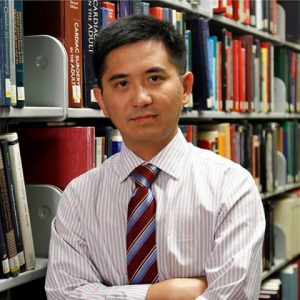The Pilot and Feasibility program at the University of Chicago Digestive Diseases Research Core Center (DDRCC) for Interdisciplinary Study of Inflammatory Intestinal Disorders (C-IID) is designed to provide a mechanism to promote new initiatives in digestive diseases (DD)-related research. The overall objectives of this program are to support investigations which would allow the development of preliminary data sufficient for grant funding by conventional mechanisms (pilot studies) or testing of an innovative hypothesis which might have important implications or yield significant results for digestive diseases related research (feasibility studies).
Funding Opportunity for Pilot & Feasibility Projects through the
University of Chicago’s NIH/NIDDK-Sponsored
Center for Interdisciplinary Study of Inflammatory Intestinal Disorders (C-IID)
and the Duchossois Family Institute (DFI)
The award is currently unavailable until further notice
Goals: The Center for Interdisciplinary Study of Inflammatory Intestinal Disorders (C-IID) [formerly named the Digestive Diseases Research Core Center (DDRCC)], the Section of Gastroenterology, Hepatology, and Nutrition and the Duchossois Family Institute (DFI) have joined in partnership to award up to 5 Pilot and Feasibility awards at $50,000 each for research on digestive health and diseases. Proposals that involve studies of inflammatory bowel diseases (IBD) and related areas of intestinal inflammation, the gut immune system, the gut microbiome, host-microbe interactions, microbiome-based biotherapeutics, hepatic and digestive functions, host-microbe metabolism, and epithelial biology/developmental regulation of the gut will be given special consideration.
Investigator Tracks (in order of preferential consideration)
Track I. Early stage investigators proposing investigations in the mission areas of the C-IID and DFI. This is the principal target group and is intended ideally for candidates without current NIH or other significant extramural support to initiate research into digestive health and diseases.
Track II. Established faculty outside of gastrointestinal research who wish to extend their investigations into the mission areas of the C-IID and DFI.
Track III. Faculty doing research in digestive health and diseases who wish to branch out into new areas or test novel hypotheses that are significantly different from their mainstream research.
Current and Previous Pilot and Feasibility Recipients
2024-2025
 Alice Cheng, MD, PhD
Alice Cheng, MD, PhD
Assistant Professor
Microbiome and host editing for precision engineering of the enterohepatic bile acid pool
Martina Damo, PhD
Assistant Professor
Exploring liver-specific mechanisms of anti-viral immune responses
 Bryan Dickinson, MD
Bryan Dickinson, MD
Professor
Co-investigator, David Rubin, MD
Optimization of a rapid, quantitative, at-home test for Calprotectin to monitor gut inflammation
 Noah Mitchell, PhD
Noah Mitchell, PhD
Assistant Professor
Mechanisms of tissue stretching during gut tubulogenesis
 Lavanya Visvabharathy, PhD
Lavanya Visvabharathy, PhD
Research Assistant Professor
How does a persistent viral reservoir in the gut impact long COVID-induced dysbiosis, gut barrier dysfunction, and T cell metabolism?
2023 – 2024
 Anindita Basu, PhD
Anindita Basu, PhD
Assistant Professor
Co-investigator, Ran Blekhman, PhD
Coherent Multi-Omics of Host and Microbiome in Crohn’s Disease

Axel R. Concepcion, PhD
Neubauer Family Assistant Professor
Decoding the mechanism underlying the autoimmune liver inflammation in a mouse model of Primary
Biliary Cholangitis
 Edwin McDonald IV, MD
Edwin McDonald IV, MD
Assistant Professor of Medicine
Co-Investigator Ashley Sidebottom, PhD, DFI Metabolomics director
Collaborator, Eugene Chang, MD
Assessment of Fecal Microbial Metabolomics to Evaluate the Efficacy of Nutritional Education and Practices for Metabolic Health of Underserved and Underrepresented Minority Urban Communities

Benjamin Shogan,MD
Associate Professor of Surgery
Co-investigator, Nicholas Suss, MD
Elucidating the mechanisms by which preoperative nutritional modulation presents colorectal cancer
recurrence in a murine model
Bozhi Tian, PhD
Professor
Co-investigator, Jiping Yue, PhD
Electrostatically Assembled Polysaccharide Hydrogel Composites for Colonic Mucosal Barrier Enhancement
2022-2023

Nicolas Chevrier, PhD
Assistant Professor
Pritzker School of Molecular Engineering
Organism-wide analysis of the digestive enzyme storm caused by acute pancreatitis
 Sonia Kupfer, MD
Sonia Kupfer, MD
Associate Professor of Medicine
Section of Gastroenterology, Hepatology & Nutrition
Role of bile acids in colorectal cancer disparities
 Megan McNerney, MD, PhD
Megan McNerney, MD, PhD
Associate Professor
Pediatrics Hematology/Oncology and Pathology
Pilot studies for a novel regulator of human intestinal epithelium regeneration
 Sebastian Pott, PhD
Sebastian Pott, PhD
Assistant Professor
Department of Medicine, Section of Genetic Medicine
Identification of cell-type specific transcriptional and epigenetic changes in the intestinal epithelium associated with chronic inflammation

Roshni Roy Chowdhury, PhD
Assistant Professor
Pritzker School of Medicine
The microbiota-T cell axis in the link between the appendix and ulcerative colitis
2021-2022
 Aly Khan, PhD
Aly Khan, PhD
Research Assistant Professor
Department of Pathology
Spatial transcriptomics and metagenomics in health and disease
 Cambrian Liu, PhD
Cambrian Liu, PhD
Research Assistant Professor
Pritzker School of Medicine
Cellular diversity and spatial organization of the human anal transition zone in inflammatory bowel disease
 Deepika Sharma, PhD
Deepika Sharma, PhD
Postdoctoral Fellow
Pritzker School of Medicine
Epigenetic regulation in myeloid cells controls neural cues for colitis
 Roshni Roy Chowdhury, PhD
Roshni Roy Chowdhury, PhD
Assistant Professor
Pritzker School of Medicine
Host and microbial basis of human appendiceal inflammation
 Tao Pan, PhD
Tao Pan, PhD
Professor
Department of Biochemistry & Molecular Biology
Novel Epigenetic Modifications of Defined Genomic Hypervariable Regions of Bacteroides fragilis associated with Transition to a Pathobiont State in the Development of UC pouchitis
2020 – 2021

Nicolas Chevrier, PhD
Assistant Professor
Pritzker School of Molecular Engineering
Organism-wide analysis of digestive diseases
 Jessika Fuessel, PhD
Jessika Fuessel, PhD
Department of Medicine
Multi-omics investigation of the chemical currencies of host-microbe interactions
 Jun Huang, PhD
Jun Huang, PhD
Assistant Professor
Pritzker School of Medicine
Development of An IL-17A Chimeric Antigen Receptor Regulatory T Cell (CAR-Treg) for Treatment of Inflammatory Bowel Diseases
 Sam Light, PhD
Sam Light, PhD
Assistant Professor
Department of Microbiology
Characterization of cholesterol-reducing members of the gut microbiota

Ankit Malik, PhD
Department of Gastroenterology
Intestinal epithelial cells control T cell immunity in Inflammatory Bowel Disease

Mark Mimee, PhD
Assistant Professor
Department of Microbiology
Engineering gut Lachnospiraceae and Alistipes spp. to illuminate their role in inflammatory bowel disease


